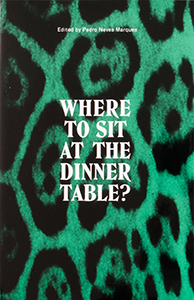An anthology interrogating the concept of antropofagia in
Brazilian thought and its philosophical, ecological, and cosmopolitical influence.
To eat a frog, the missionary Jesuit priest, the enemy tribe, the whole history of colonial domination in South America, is to serve your ancestor at a dinner table, without nostalgia, for what you are digesting is your future as a human—and that includes a frog-future as well. In the Sixteenth century, the image of Amerindian anthropophagy was at the center of disputes on the meaning of humanity. In the early Twentieth century, it was again re-discovered by the Brazilian avant-garde associated with the imprint Revista de Antropofagia. Antropofagia is a cosmopolitical philosophy, a cannibal metaphysics extending well beyond a pacifying, multicultural view of appropriation. Eating another human is to cross the ontological boundaries imposed by Western modernity, capitalist labor, the Cartesian-Freudian self. Nature and culture are in the perspective of the hunter and the hunted. To become prey is the movement of humanity.
Edited by the writer and visual artist
Pedro Neves Marques, this publication is a thorough anthology on Brazilian Antropofagia. It presents Antropofagia not simply as an aesthetic movement, based on acculturation or an hybridity exemplary of the tropics, but as a full scope South American cosmopolitics, defined by predation and the immanence of the enemy, by an humanity unbound from species, and a technology aimed at leisure.
The first half of the book, “The Forest and The School” gathers texts from sixteenth century chronicles on cannibalism, the Brazilian avant-garde, Tropicália, and the anthropology of Pierre Clastres, Bruno Latour, Eduardo Viveiros de Castro, as well as of Davi Kopenawa. The second half “Where to sit at the dinner table?” collects recent texts and new commissions relating Antropofagia to multinaturalist perspectivism, the declaration of the Rights of Nature, or the centrality of the indigenous in current political struggles.
Published following the eponymous three-days program at the Academy of Arts of the World in Cologne, 27-29 November, 2014.

